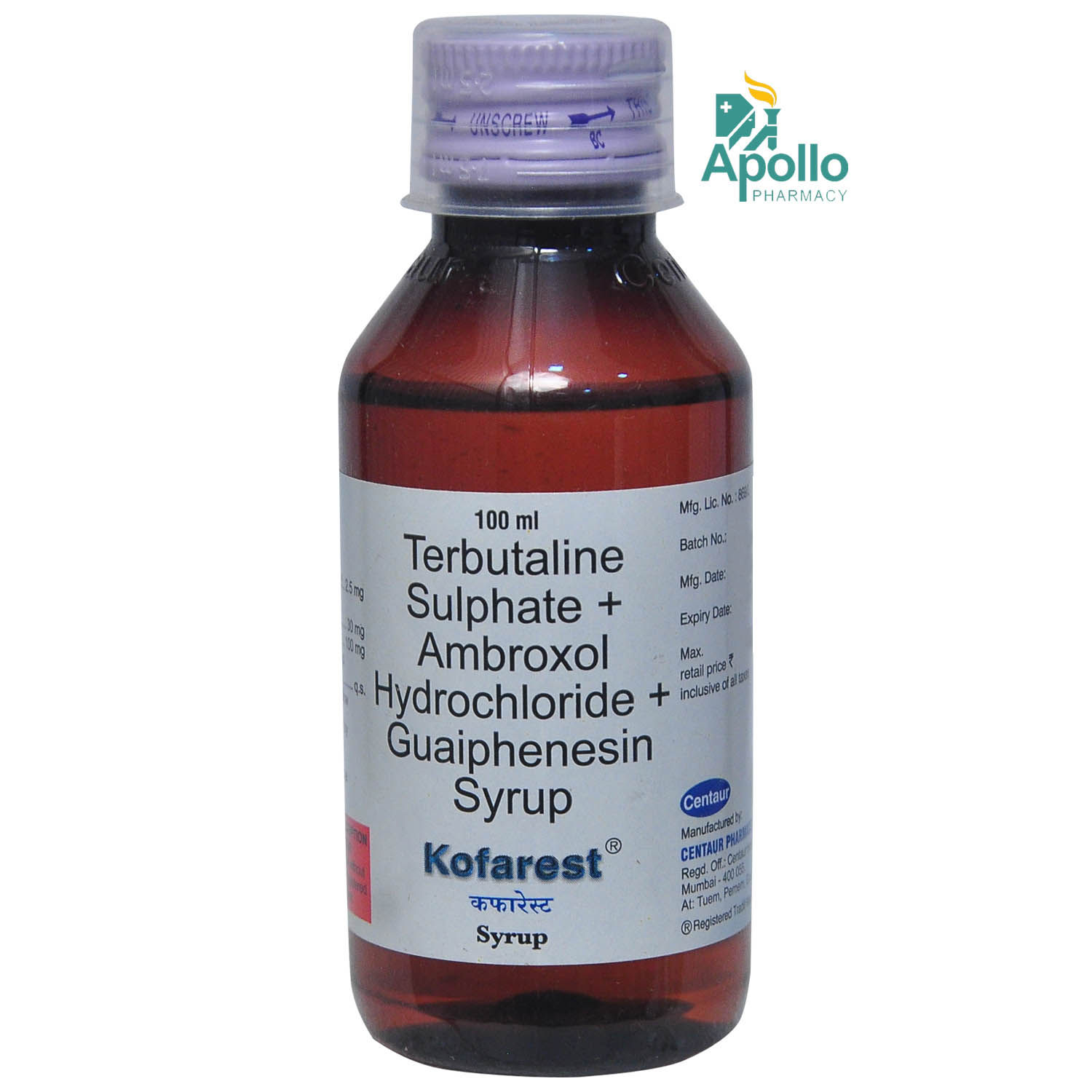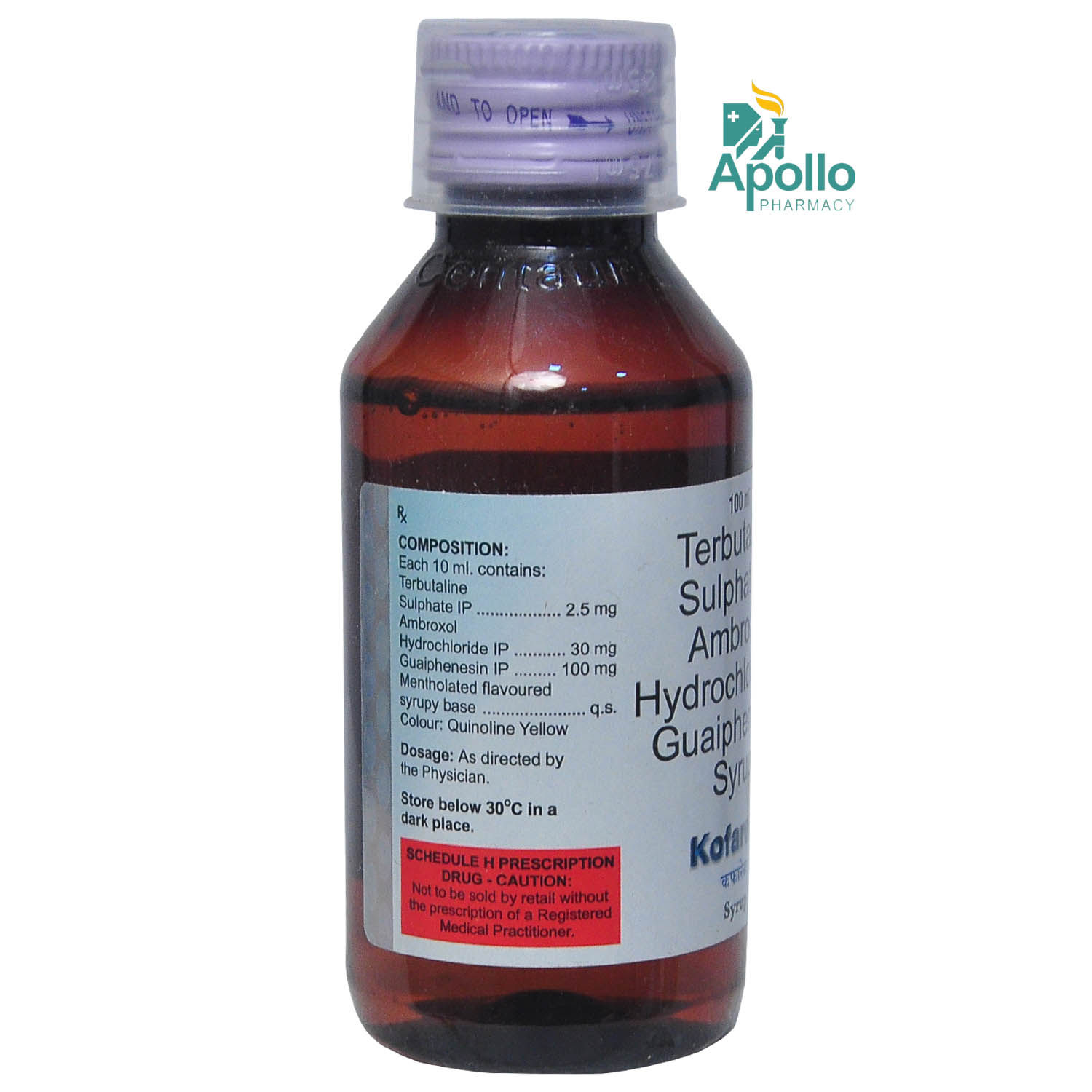Kofarest Syrup 100 ml
₹135*
MRP ₹150
10% off
₹127.5*
MRP ₹150
15% CB
₹22.5 cashback(15%)
Free Delivery
With Circle membership
(Inclusive of all Taxes)
This offer price is valid on orders above ₹800. Apply coupon PHARMA10/PHARMA18 (excluding restricted items)
Know Your Delivery Time
Provide Delivery Location



Available Offers
 Prescription drug
Prescription drugWhats That
 27 people bought
27 people bought 
Secure Payment

India's Most Trusted Pharmacy

Genuine Products
Manufacturer/Marketer :
Consume Type :
Return Policy :
Expires on or after :
About Kofarest Syrup
Kofarest Syrup belongs to the class of medicines called expectorants primarily used to treat cough associated with mucus. Coughing (dry or productive) is a body's way of clearing irritants (like allergens, mucus or smoke) from airways and preventing infection. There are two types of coughs, namely: Dry cough and chesty cough. A dry cough is tickly and doesn't produce any vicious or thick mucus, while a chesty cough (wet cough) produces mucous or sputum.
Kofarest Syrup contains Ambroxol, Guaiphenesin and Terbutaline. Ambroxol works by thinning and loosening phlegm (mucus) in the lungs, windpipe and nose. Guaiphenesin increases the volume of fluid in the airways, reduces the stickiness of mucus, and removes it from the airways. Terbutaline relaxes muscles and widens the airways. Thereby, it makes breathing easier. Together, Kofarest Syrup helps provide relief from cough.
Your doctor will recommend the dose and duration based on your medical condition. In some cases, you may experience common side effects such as nausea, vomiting, drowsiness, headache, dizziness, nervousness, and stomach upset. Most of these side effects do not require medical attention and gradually resolve over time. However, if the side effects persist or worsen, please consult your doctor.
Consult your doctor if you are pregnant or breastfeeding. Kofarest Syrup should be used with caution in children if prescribed by a doctor. If you are suffering from fits or have a history of fits, please inform your doctor before taking Kofarest Syrup as it may increase the risk of recurrent fits. If you have diabetes, regular monitoring of blood sugar levels is recommended while taking Kofarest Syrup . Keep your doctor informed about your health condition and medications to rule out any interactions/ side effects.
Uses of Kofarest Syrup
Directions for Use
Medicinal Benefits
Kofarest Syrup is a combination of three drugs, namely: Ambroxol, Guaiphenesin and Terbutaline. Ambroxol belongs to the class of mucolytic agents (cough/sputum thinner) that works by thinning and loosening phlegm (mucus) in the lungs, windpipe and nose for coughing out easily. Guaiphenesin belongs to the class of expectorants; it increases the volume of fluid in the airways, reduces the stickiness of mucus, and removes it from the airways. Terbutaline is a bronchodilator that relaxes muscles and widens the airways. Thereby, it makes breathing easier. Together, Kofarest Syrup helps provide relief from cough.
How Kofarest Syrup Works
Storage
Side Effects of Kofarest Syrup
- Nausea
- Vomiting
- Stomach upset
- Drowsiness
- Dizziness
- Headache
What if I have taken an overdose of Kofarest Syrup
Drug Warnings
Avoid taking Kofarest Syrup if you are allergic to any of its components. If you are pregnant or breastfeeding, it is advised to inform your doctor. Drive only if you are alert after taking Kofarest Syrup as it may cause dizziness or drowsiness in some people. Inform your doctor if you have diabetes, fits, high blood pressure, overactive thyroid, stomach ulcers, phenylketonuria (a congenital disability that causes accumulation of amino acid, phenylalanine in the body), kidney, liver or heart problems.
Drug-Drug Interactions
Drug-Drug Interactions
Login/Sign Up
-
How to manage the interaction:
Co-administration of Kofarest Syrup 100 ml with Procarbazine can possibly result in an interaction, but it can be taken if your doctor has advised it. Do not discontinue any medications without first consulting your doctor.
Combining Tranylcypromine with Kofarest Syrup 100 ml can increase the risk of high blood pressure.
How to manage the interaction:
Although taking Kofarest Syrup 100 ml and Tranylcypromine together can evidently cause an interaction, it can be taken if your doctor has suggested it. If you take multiple medications that can raise your blood pressure, it may increase your risk of having high blood pressure while lying down. It's important to regularly check your blood pressure, especially when lying down or with your head elevated, and watch out for any signs of side effects. Do not stop using any medications without a doctor's advice.
Combining Kofarest Syrup 100 ml and nilotinib can increase the risk of an irregular heart rhythm.
How to manage the interaction:
Taking Kofarest Syrup 100 ml and nilotinib together can lead to an interaction, it can be taken if advised by your doctor. However, if you experience any symptoms like sudden dizziness, lightheadedness, fainting, shortness of breath, heart palpitations, diarrhea, or vomiting, contact your doctor immediately. Do not discontinue any medications without first consulting your doctor.
Using Kofarest Syrup 100 ml together with amisulpride can increase the risk of severe irregular heart rhythm.
How to manage the interaction:
Amisulpride and Kofarest Syrup 100 ml can cause an interaction, but it can be taken if prescribed by a doctor. You should seek immediate medical attention if you develop sudden dizziness, lightheadedness, fainting, shortness of breath, or heart palpitations. Do not stop using any medications without talking to a doctor.
Taking Kofarest Syrup 100 ml with Ziprasidone can increase the risk of abnormal heart rhythm.
How to manage the interaction:
Co-administration of Ziprasidone with Kofarest Syrup 100 ml can possibly result in an interaction, but it can be taken together if prescribed by a doctor. However, consult your doctor if you experience sudden dizziness, lightheadedness, fainting, shortness of breath. Do not discontinue any medications without consulting a doctor.
Taking Carvedilol and Kofarest Syrup 100 ml may reduce the beneficial effects of both medications.
How to manage the interaction:
There may be a possibility of interaction between Kofarest Syrup 100 ml and Carvedilol, but it can be taken if prescribed by a doctor. Consult your doctor immediately if you experience shortness of breath, palpitations, or chest discomfort. Do not stop using any medications without a doctor's advice.
Co-administration of Labetalol and Kofarest Syrup 100 ml together can decrease the medical benefits of both medications.
How to manage the interaction:
Although taking Labetalol and Kofarest Syrup 100 ml together can result in an interaction, it can be taken if a doctor has prescribed it. Do not forget to inform the doctor if you have severe chronic obstructive pulmonary disease (COPD) or a history of asthma, as labetalol is often not advised in these conditions. Do not discontinue any medications without a doctor's advice.
Using sotalol together with Kofarest Syrup 100 ml may reduce the benefits of both medications since they have opposing effects in the body.
How to manage the interaction:
Taking Sotalol with Kofarest Syrup 100 ml together can result in an interaction, but it can be taken if a doctor has advised it. Do not stop using any medications without a doctor's advice.
The combined use of Kofarest Syrup 100 ml and Disopyramide can increase the risk of an irregular heart rhythm.
How to manage the interaction:
Co-administration of Kofarest Syrup 100 ml and Disopyramide can lead to an interaction, it can be taken if advised by your doctor. However, if you experience any symptoms like sudden dizziness, lightheadedness, fainting, shortness of breath, heart palpitations, diarrhea, or vomiting, contact your doctor immediately. Do not discontinue any medications without first consulting your doctor.
Taking Gatifloxacin and Kofarest Syrup 100 ml can increase the risk or severity of irregular heart rhythms. The risk increases in patients with a history of heart illness or electrolyte imbalance.
How to manage the interaction:
Taking Gatifloxacin and Kofarest Syrup 100 ml together can possibly result in an interaction, it can be taken if your doctor has advised it. However, if you experience sudden dizziness, lightheadedness, fainting, shortness of breath, chest pain or tightness, rapid heartbeat, or memory loss, contact a doctor immediately. Do not discontinue any medications without consulting a doctor.
Drug-Food Interactions
Drug-Food Interactions
Login/Sign Up
Diet & Lifestyle Advise
- Avoid dairy products such as milk, as it may increase mucus production.
- Avoid processed or refined foods. Replace baked foods, fried foods, white bread, white pasta, french fries, sugary desserts and chips with green leafy vegetables.
- Drink plenty of fluids to avoid a dry throat. It also helps loosen mucus.
- Avoid citrus fruits as they may worsen the cough.
- Eat fruits rich in water content, such as pears, watermelon, peaches and pineapples.
Habit Forming
Therapeutic Class
Kofarest Syrup Substitute

Ventryl Expectorant 60 ml
₹1.08per tabletM-Solvin Tablet 10's
by AYUR
₹6.08per tabletXputum Tablet 10's
₹3.87per tabletEphemix-T Syrup 100 ml
₹0.70per tablet
Product Substitutes
Alcohol
Caution
Interaction of alcohol with Kofarest Syrup is unknown. Please consult a doctor before consuming alcohol with Kofarest Syrup .
Pregnancy
Caution
The safety of Kofarest Syrup in pregnant women is unknown. Consult your doctor if you have any concerns; your doctor will prescribe only if the benefits outweigh the risks.
Breast Feeding
Caution
It is unknown whether Kofarest Syrup is excreted in human milk. Consult your doctor if you have any concerns; your doctor will decide if Kofarest Syrup can be taken by breastfeeding mothers or not.
Driving
Caution
Kofarest Syrup may cause dizziness or drowsiness in some people. Therefore, drive only if you are alert after taking Kofarest Syrup .
Liver
Caution
Take Kofarest Syrup with caution, especially if you have a history of liver problems. The dose may be adjusted by your doctor as required.
Kidney
Caution
Take Kofarest Syrup with caution, especially if you have a history of kidney problems. The dose may be adjusted by your doctor as required.
Children
Caution
Kofarest Syrup should be used with caution in children if prescribed by a doctor.
FAQs
Country of origin
Manufacturer/Marketer address
Disclaimer
Author Details
We provide you with authentic, trustworthy and relevant information














